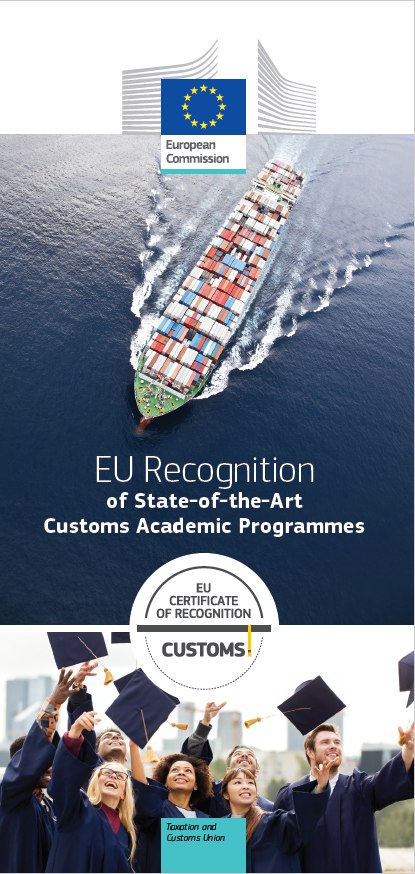EU Recognition of Customs academic programmes – 2021 outcome

In June 2021 the European Commission (Directorate-General for Taxation and Customs Union) awarded five academic programmes (Bachelor’s, Master’s, and modules within) with the “EU Recognition Certificate for Customs academic programmes”. The recognised academic programmes are expected to significantly contribute to the rise of Customs performance and professionalism.
The EU’s single market can only function properly when common rules are applied at its external borders, requiring the national customs administrations to act as one. This unification at the external borders is a complex process. It is further complicated by serious and growing problems related to issues such as terrorism, human trafficking and other crimes involving both cross-border and trans-national movements. Customs officials must possess extensive knowledge and skills to navigate this landscape in a way that ensures a smooth flow of legal trade while protecting the safety and security of EU citizens.
With so much at stake, it’s important to ensure a high-performing, connected, agile and future-proof European community of Customs professionals, both in the public and private sector. Customs education, training and professional development are the cornerstones required to build and nurture this community and to stay on par with the latest developments in the world of Customs and Trade.
Top-calibre customs academic programmes supply the European Union with skilled and knowledgeable professionals prepared to support legal international trade benefitting European economies and citizens. Customs academic programmes at the Bachelor’s and Master’s levels are instrumental in turning out well-qualified customs professionals via rigorous and demanding curricula. The curricula is based on the most current and comprehensive required competencies encompassing operational skills, strategy and management in the scope of the international supply chain.
For instance, today’s Customs professionals are required to navigate a complex trading environment – one that’s lined with challenges associated with security threats, refugee crises and electronic transactions.
Helping programmes understand and meet EU requirements
It is within this context that the European Commission is encouraging the evolution of consistent and unified academic programmes that fulfil modern needs through several important initiatives.
The EU Customs Competency Framework (CustCompeu) was created to delineate the optimal competency profiles for customs professionals working in the public or the private sector. Based on the Framework, the Commission has developed training reference programmes covering the optimal learning content (including content for higher education) to inform existing and future customs academic programmes in Europe.
Customs Bachelor’s and Master’s programmes in Europe that are aligned with the EU Reference Programmes for Academic Customs Education can apply for the EU Customs Certificate of Recognition. This EU label of excellence helps programme providers attract top students, graduates attain employment and the EU ensure a steady supply of optimally trained customs officials.
The EU Customs Certificate of Recognition application cycle runs through 31 December of each year. The 2022 application cycle will be announced in autumn. To find out more about joining the growing family of recognised customs academic programmes - click here.
Recognised Customs academic programmes (or modules thereof) can make use of the official EU Customs Certificate of Recognition identification statement and will be included in the publicly available list of EU Recognised Customs Academic Programmes.
All further documentation on the EU Recognition process is available on-line.
For more information you can contact the EU Certificate of Recognition Secretariat.
